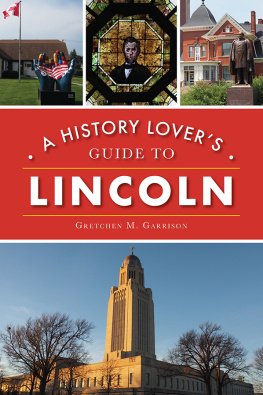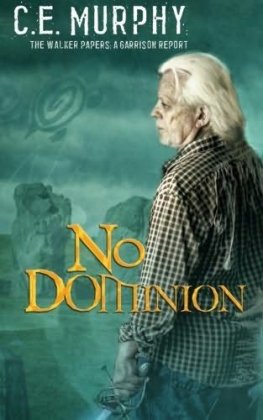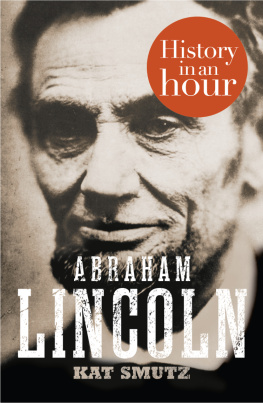Published by The History Press
Charleston, SC
www.historypress.com
Copyright 2020 by Gretchen M. Garrison
All rights reserved
First published 2020
E-Book year 2020
ISBN 978.1.4396.7019.4
Library of Congress Control Number: 2020932003
Print Edition 978.1.4671.4445.2
Notice: The information in this book is true and complete to the best of our knowledge. It is offered without guarantee on the part of the author or The History Press. The author and The History Press disclaim all liability in connection with the use of this book.
All rights reserved. No part of this book may be reproduced or transmitted in any form whatsoever without prior written permission from the publisher except in the case of brief quotations embodied in critical articles and reviews.
PREFACE
This is a travel guide to Lincolns history. To fully appreciate the present, knowing the contributions of the past is valuable. To complete this project, I consulted hundreds of sources. Many are listed in the back of this book, and even more are on my website, Odyssey Through Nebraska.
Reading history was not enough. To discover Lincoln, I explored. My step count soared as I walked under Lincoln and looked over Lincoln through bell tower windows. I took tours and walked down streets to connect to the past.
To be clear, this is not an exhaustive Lincoln history. Former mayor Andrew Sawyer wrote his two-volume Lincoln history in 1916. Writing about all of Lincolns significant moments over 150 years would fill an encyclopedia set. But my hope is that because of this book, Lincoln, Nebraska, will be better understood. Please come along with me as I introduce you to my hometown.
ACKNOWLEDGEMENTS
To God, you gave me new glimpses of You throughout this project that I did not expect. Thank you for providing your strength and direction.
To my Kyle, God knew that you would be for me everything I didnt know I needed. I love you! And to our kids, Gabriel, Zeke, Kaylee and Isaac, only all of you know the price of this project. Thanks for loving me even though I had to pick the computer sometimes. Thank you for keeping it real and for caring more about what I am making for supper than about the fact that my job sometimes involves signing autographs. Love to you and to the rest of my amazing family as well.
To Kyle, all four grandparents, Sheila, Becky, Sarah and Suzy, thanks for helping me with kid logistics all while encouraging me to keep writing. What a blessing to have such a strong support system!
To Brenna, thank you for being my cheerleader, going on photo adventures and then helping me pick the best shots. Grateful for you! Thank you also to Jonica for always caring enough to ask how I am really doing. Thank you to Tonya for the walks of wisdom. And thank you to Roberta for encouraging me to keep going.
Community is everything, and I am so thankful for those I get to live life with: Upper Room, C.E.N.T.E.R, #LNK Blog Love, LCS 92 girls, Lincoln Eagles, Lancaster Learning Link, and Girlie Gourmands.
To Mr. Rex: Not only did you teach me how to research, write and edit well, you also helped me to enjoy the process. To you and all of my teachers, thank you!
To Ben Gibson at The History Press, from our first phone conversation, I knew that I was going to enjoy working with you. Your enthusiasm and assistance with this project went far above and beyond your job description. Thank you.
To Hayley, thank you for your work proofreading and editing my many words. Most of all, thank you for asking me to clarify many incomplete thoughts that would not have made sense to anyone but me.
To Diane, for pulling hundreds of sources for me and for making the Heritage Room such a pleasant place to research. I could not have written this book without your help.
To Ed Zimmer and Jim McKee, thank you for capturing Lincolns history so well. Almost everybody I talked to about this project asked me if I had talked to both of you gentlemen. Thank you for graciously answering my random potpourri of questions.
To all of the Lincoln locals who made this project possible, thank you for sharing your expertise with me. This book is more than it could have been because of you. Your names are individually acknowledged in the back and even more are listed on my website, as I had to tell more about my various adventures. You all brought Lincoln to life.
In September 1999, the author and her family celebrated at Billys Restaurant in Lincoln. Left to right: R.B. and Florence Michels, Roylene and Dale Michels, DeLoris and Keith Gustafson and Gretchen Michels and her then fiance, Kyle Garrison. Authors collection.
INTRODUCTION
Lancaster became Nebraskas capital city because of salt. The saltiness of Omahas earliest characters and territorial legislators resulted in fist fights and a complete elimination of the criminal code. Compromises seemed impossible. Requiring slavery sympathizers (also known as South Platters) to rename the capital Lincoln mattered not. As this 1854 territory became Nebraska the state in 1867, a fresh start was needed.
The State Capitol Commission was formed. Governor Butler, state auditor Gillespie and secretary of state Kennard would pick the capital. Mosquitoes eliminated Ashland. Nebraskas very first batch of ice cream may or may not have involved salt, but the commission did determine that the sweet treat made by the Yankee Hill ladies constituted a bribe.
The salt flats industry on Lancasters edge seemed promising. But some critical plots of land were already owned. Jacob Dawson, John Giles and Luke Lavendar were offered compensation for those properties. Dawson and Giles agreed. Lavendar demanded $1,000 extra. Somehow, someone paid. Only Lavendars former cabin site at Fourteenth and O Streets is recognized with a plaque. In the sweltering attic of John Donovans house, after two different attempts, the commissioners unanimously voted yes. Lancaster was no more, and Lincoln was Nebraskas capital.
Selling lots to expand a village of thirty people was daunting. But rain did not keep away crowds on September 17, 1867. The band kept the atmosphere festive. Though it was estimated at forty dollars, the first lot sold for only a quarter. While the commissioners were there, they did not bid. Hardly any money was made that day. Without their participation, no one else would take a risk.
This aerial view of Nebraskas capitol was given to the authors grandparents from a family photographer friend and hung on their living room wall. Authors collection.
After another desperate meeting at Donovans house, they determined the capital was worth fighting for. These men would help the process. Bids the following days ranged from $40 to $150 per lot.

















